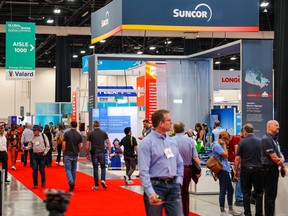
Premier Danielle Smith is promising to go as far as she needs to in order to protect Alberta’s interests in the face of energy transition, and would not rule out the use of the controversial sovereignty act to do so.
Smith made these comments to the media following her address on Tuesday, the first day of the Global Energy Show in Calgary, noting she is willing to work with Ottawa on the transition but not at the expense of the Alberta economy. She emphasized the need to first focus on achievable goals.
“We have to fight it with every power that we have,” she said. “The constitution is pretty clear that Alberta has the right to develop its resources in its own way. And because I’ve set an emissions reduction target that’s in line with the federal emissions reduction target of 2050, then I believe that the Supreme Court will side with us, but we’ll have to find out and I’m prepared to defend our jurisdiction.”
The premier has already stated her position with the federal government following the election on May 29. Ministers Dominic LeBlanc and Jonathan Wilkinson will be coming to Alberta next week to discuss the energy transition further.
Smith said a 42-per-cent emissions cap reduction by 2030 was not achievable; neither was net zero on the power grid. The premier said the focus is on shared interests in creating jobs, wealth, investment and prosperity, while diversifying the economy and reducing global emissions, alongside working together on LNG export and carbon capture, utilization and storage, and building out hydrogen infrastructure.
During her address she said hydrogen has the potential to replace oil and gas as an economic driver and industry in Alberta.
‘Tug of war’ happening between province and federal government over 2035 net-zero target
The energy transition was front and centre on Day 1 of the conference which includes more than 300 speakers, 600 companies for the show floor and a record 30,000-plus pre-registered attendees. Nick Samain, senior vice president of energy for DMG Events which hosts the show, said this was very intentional.
“That transition is coming in and like a lot of things in energy, it’s polarizing,” he said.
One of the big hurdles is coming to an agreement on what the transition looks like and how to do it equitably.

The debates have raged for years between levels of government and industry. In many cases it is stalling progress on developing carbon reduction initiatives, be it renewable energy, decarbonized oil and gas development, electrification, or resource development.
In many cases Canada and Alberta are lagging behind the U.S. on policy and support of initiatives to develop technology and industry in the transition, largely because of the Inflation Reduction Act (IRA).
Dan Balaban, CEO of Greengate, said there is a “tug of war” going on between the province and the federal government over the 2035 net-zero target for the electricity grid.
“I agree that that’s an awfully ambitious target,” he said during a panel discussion on the energy transition. “But the longer we wait, the harder it will be to achieve. The longer we debate with each other about whether or not it’s a good thing to do, the harder it will be to achieve, and I ask, can we afford to wait?”
Chamber of Commerce CEO optimistic about push toward sustainability
Dale Swampy, CEO of the National Coalition of Chiefs, said the transition is already underway. He pointed to 146 renewable energy projects in the province, more than double the rest of the country combined. This includes the largest solar array project in Canada near Vulcan.
Key to this has been a growing role for Indigenous communities, including ownership in energy projects. This has helped pave the way for equitable and safer environmental solutions. He said a First Nations stake in the Pathways Alliance CCUS projects will be critical going forward.
“We don’t leave the country; companies come and go, people come and go, Canadians and foreigners come and go, but we’re always there,” he said. “We think it only makes sense that we should own and develop CCUS projects. Anything that has to do with environmental protection, remediation, and so forth should be developed and done by us.”
Recommended from Editorial
-

Smith throws down gauntlet in energy feud with Ottawa
-

Braid: Premier Smith won’t sing the climate change tune, for good reason
-

Cenovus CEO sees silver lining for oilpatch jobs in energy transition
-

‘Toxic’ just transition labelling is out as Ottawa concedes words matter in energy shift
The conference hits a week after layoffs by Suncor and TC Energy, despite record profits by oil companies last year that did not lead to an influx of investment by these companies.
Deborah Yedlin, president and CEO of the Calgary Chamber of Commerce, said there is still a sense of optimism in the sector in Calgary. She sees ideas and initiatives being formed in the Energy Transition Centre and work being done in the sector to push towards sustainability through the transition.
“I don’t think we’ve ever seen (the) level of collaboration that we’re seeing today,” she said. “We know that we have to compete…and so we’re now seeing governments train their minds to it. People are getting excited about what’s possible and we’re getting that response that we need, not as fast, perhaps, as we’d like, but still there’s a recognition that we can actually make a difference. And in Calgary…there’s a sense of excitement in the energy sector today that we haven’t seen for a long time.”
Twitter: @JoshAldrich03
You can read more of the news on source
